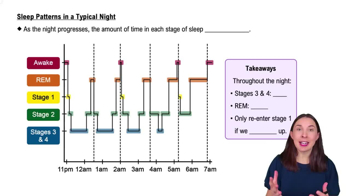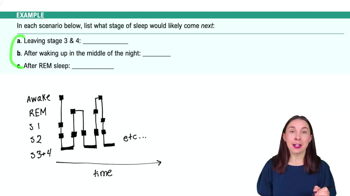Table of contents
- 1. Introduction to Psychology1h 43m
- 2. Psychology Research2h 20m
- 3. Biological Psychology2h 41m
- 4. Sensation and Perception28m
- 5. Consciousness and Sleep32m
- 6. Learning41m
- 7. Memory34m
- 8. Cognition37m
- 9. Emotion and Motivation35m
- 10. Developmental Psychology33m
- 11. Personality48m
- 12. Social Psychology41m
- 13. Stress and Health41m
- 14. Psychological Disorders44m
- 15. Treatment47m
5. Consciousness and Sleep
Sleep
Struggling with Psychology?
Join thousands of students who trust us to help them ace their exams!Watch the first videoMultiple Choice
As the basal metabolic rate (BMR) _____ with age, the weight set point _____.
A
increases; increases
B
decreases; decreases
C
decreases; increases
D
increases; decreases
 Verified step by step guidance
Verified step by step guidance1
Understand the concept of Basal Metabolic Rate (BMR): BMR is the rate at which your body uses energy while at rest to maintain vital functions such as breathing and keeping warm.
Recognize the relationship between BMR and age: As people age, their BMR typically decreases because of a loss of muscle mass and other physiological changes.
Define the weight set point: This is the weight range in which your body is programmed to function optimally. It is influenced by genetics, hormones, and lifestyle factors.
Analyze the relationship between BMR and weight set point: When BMR decreases with age, the body may adjust its weight set point upwards to maintain energy balance, as the body becomes more efficient at using energy.
Conclude the relationship: Therefore, as BMR decreases with age, the weight set point tends to increase, which explains the correct answer choice 'decreases; increases'.

 3:25m
3:25mWatch next
Master Circadian Rhythms with a bite sized video explanation from Hannah Gordils
Start learningRelated Videos
Related Practice


































































































![Race, Genes and IQ Differences | Bret Weinstein [Mini Clip]](https://img.youtube.com/vi/IztL_m3pd70/mqdefault.jpg)



































































































